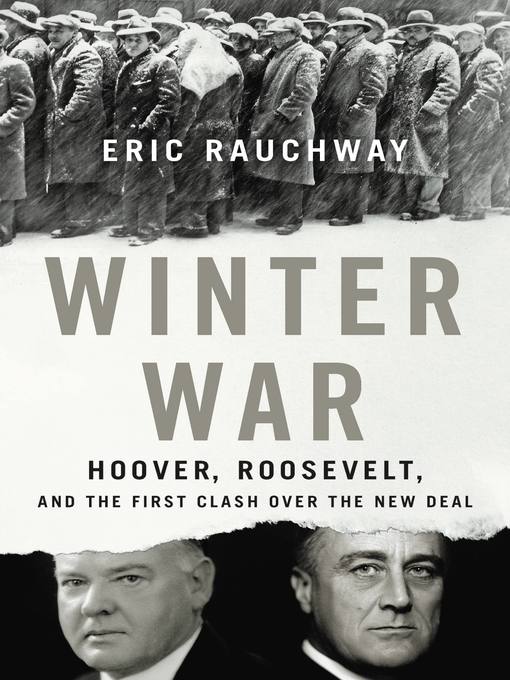
Winter War
Hoover, Roosevelt, and the First Clash Over the New Deal
کتاب های مرتبط
- اطلاعات
- نقد و بررسی
- دیدگاه کاربران
نقد و بررسی

September 10, 2018
Using a formal but accessible style, Rauchway (The Money Makers) explores the months between Franklin Delano Roosevelt’s electoral victory over President Herbert Hoover and his inauguration in this case study of a transition of power that proves both edifying and engaging. Rauchway asserts that from the November 1932 election to FDR’s inauguration at the beginning of March 1933, Hoover was “looking to the long term, not the current crisis” in the belief “that the future of the country depended on his return to power.” Rauchway depicts an embittered Hoover seeking to score political points to make his case for future elections instead of seeking meaningful collaborations with FDR to take on the perilous issues that beset the nation. Rauchway succeeds in detailing the major issues that Roosevelt grappled with, devoting chapters to England and France’s default on the repayment of international loans from WWI, the farm crisis, civil rights for African-Americans, Hitler’s rise to power, and the pandemic of bank runs and closures. Hoover mostly disappears during the book’s middle portions, ceding the narrative focus to FDR, which undermines the book’s central tension. But the book showcases strong scholarship, including deep engagement with archival materials, that a general audience can appreciate. This is an informative and readable history.

October 1, 2018
A Depression-era history of an exceedingly difficult transition from one president to another.Franklin Roosevelt crushed Herbert Hoover on Nov. 8, 1932, and assumed the presidency on March 4, 1933. Though scholars have not ignored those four months, the period was a spectacularly eventful one that deserves closer attention. Rauchway (History/Univ. of California, Davis; The Money Makers: How Roosevelt and Keynes Ended the Depression, Defeated Fascism, and Secured a Prosperous Peace, 2015, etc.) does just that in this lively, opinionated, and definitely not revisionist history. Historians are re-evaluating Hoover's reputation as a dour technocrat who failed to address the Depression. Rauchway portrays him as an energetic and workaholic man convinced that direct government relief would destroy our freedom. He described Roosevelt as an unprincipled politico who intended to inflict a radical "New Deal" on America. The author agrees, emphasizing that Hoover's prediction that Roosevelt was planning reforms was correct, but he points out that subsequent historians have generated the "myth of Roosevelt as an ignorant but blithe spirit simply trying expedients until he found some that worked." Rauchway documents the new president's consulting experts and legislators for ideas. Even before inauguration, supporters introduced several New Deal bills to the lame-duck Congress. Except for the repeal of Prohibition, all were defeated. The author paints a grim picture of a nation awash with misery and on the verge of revolution--a feeling shared by members of Hoover's administration if not Hoover himself. Many experts complain that Roosevelt stubbornly refused to cooperate during the interregnum, but "cooperation," according to Rauchway's Hoover, meant foreswearing deficit spending, government regulations, relief, public works, and currency inflation (i.e. the New Deal), which, Hoover believed, would make matters worse.Roosevelt's iconic hundred days followed another hundred days, far more obscure but equally critical, and Rauchway's insightful history brings it vividly to life.
COPYRIGHT(2018) Kirkus Reviews, ALL RIGHTS RESERVED.

November 15, 2018
With his latest work, Rauchway (history, Univ. of California, Davis; The Money Makers) asserts that the 1932 election of Franklin D. Roosevelt as U.S. president constituted the beginning of a political conflict that has lasted through to the present day. Rauchway maintains that both outgoing president Herbert Hoover and Roosevelt thought of themselves as pitted in an existential struggle for the future of America. Each man diametrically opposed the policies of the other but was able to do so because each possessed intimate knowledge of the other's positions. This clash over the New Deal "forced both sides to defend and elaborate" platforms from the campaign, each targeting "what he considered an existential threat to civilization." Such a vigorous political struggle came at a time of extreme unrest and political upheaval. Rauchway spends considerable time exploring how Roosevelt and his circle prepared for the White House; Hoover's persistent opposition remains a constant if less present thread. While additional attention could have been given to this political conflict, Rauchway's work is well supported by primary material. VERDICT This valuable and insightful read offers a vivid glimpse into the political and economic world of Depression-era America.--Philip Shackelford, South Arkansas Community Coll.
Copyright 2018 Library Journal, LLC Used with permission.

























دیدگاه کاربران